
A parlor is a place for special visitors, and on Wednesdays this summer, the parlor at Legacy Pointe—part of the Silvercrest Legacy Senior Living Community in Iowa City—has had a special visitor in the person of Paul Ingram. Booklovers in Iowa City and beyond know Ingram as one of the central personalities at Prairie Lights Books. His enthusiasm and knowledge have connected many a book and a reader over the years. At Legacy Pointe, he’s been connecting a group of about 14 residents with Mildred Armstrong Kalish’s Little Heathens: Hard Times and High Spirits on an Iowa Farm During the Great Depression.
I joined a group of 12 women and two men in the parlor on an early August evening to listen to Ingram read from Kalish’s memoir of her childhood. Ingram is an engaged and engaging reader, and his audience members were plainly right there with him—or perhaps more accurately, right there with Kalish, remembering their own childhoods.
During my visit, Ingram read passages focusing on the rituals of schooldays, the social hierarchy of children, and the customs of box socials. Kalish isn’t a flashy stylist, but she’s consistently funny. Ingram mines that humor to good effect, and his audience chuckled and chortled at the misadventures Kalish relates. An anecdote involving a rotten egg and another centered on the machinations of a young, pretty teacher at a box social produced quite a bit of mirth, and it was clear that the memories were flowing for the listeners.
“You guys remembering this?” Ingram asked after a detailed account of dipping a pen in ink to complete lessons at school. It was just one of quite a number of times Ingram lifted his eyes from the text to interact with his audience. The group shared reminiscences about learning and teaching in one-room schoolhouses, about the restrictive nature of teacher contracts at the time—including the common clause that voided the contract if a teacher got married—and about the food tucked away in the eponymous boxes at box socials.
Ingram wrapped things up after a bit better than 40 minutes and introduced me to the group, leading to a discussion of the reasons this weekly reading and conversation is important to listeners and reader alike.
“I just love these people,” Ingram said of his audience, which includes his Aunt Sally. “In the first place, I love to read out loud, and in the second place, I’m reading to people who know about things that I don’t know about and that’s very interesting.”
And for the listeners? “I like it because it evokes old memories, some of which I experienced and some of which I just heard of,” said a woman named Jane. Jim, though he grew up in Brooklyn rather than in a rural environment, agreed: “There’s a lot in [the book] that is the same as I experienced…. A lot of it was the condition of the times.”
Ingram was noticeably past halfway in Little Heathens on the evening I visited. Given the affectionate connection he has formed with his listeners, I couldn’t imagine that the end of the book would mark the end of the visits, and Ingram confirmed that he has another book ready to go.
Steven R. Kinsella’s 900 Miles from Nowhere: Voices from the Homestead Frontier, published by the Minnesota Historical Society Press, includes letters, diaries, and photographs that chronicle the challenges faced by early settlers in the Great Plains. While it sounds like a somewhat bleaker book than the one they are now enjoying, it promises to evoke more memories and spark more conversation on Wednesday evenings.
Meanwhile, Kalish is coming to Iowa City to read at Shambaugh Auditorium in University of Iowa’s Main Library under the auspices of the “Live from Prairie Lights” series on Monday, September 17, 2007, and Ingram has assured his friends that he will try to arrange a visit to Legacy Pointe. But even prior to meeting the author, everyone seemed to feel as if they had already hosted Kalish in the parlor.
“What this woman gives me,” Ingram explained, speaking of Kalish, “is a sense of where we came from, and what these people give me is absolute proof that it’s true. These people lived this life.”
“And it was good,” confirms a voice from the group. Certainly, this communal exploration of the past is very good for everyone involved.
